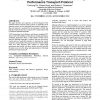35 search results - page 6 / 7 » Why share in peer-to-peer networks |
EUROMICRO
2004
IEEE
13 years 11 months ago
2004
IEEE
The migration from 3rd generation mobile communication networks to 4th generation, purely IP-based networks leads to new chances, but also great risks for the traditional mobile n...
SC
2004
ACM
14 years 29 days ago
2004
ACM
This paper describes our experiences in the development of the UDP-based Data Transport (UDT) protocol, an application level transport protocol used in distributed data intensive ...
DSD
2002
IEEE
14 years 15 days ago
2002
IEEE
Continuing VLSI technology scaling raises several deep submicron (DSM) problems like relatively slow interconnect, power dissipation and distribution, and signal integrity. Those ...
GLOBECOM
2008
IEEE
14 years 2 months ago
2008
IEEE
Long-range dependence (LRD) is a widely verified property of Internet traffic, which severely impacts network performance yielding longer queuing delays. Moreover, LRD is almos...
SP
1997
IEEE
13 years 11 months ago
1997
IEEE
Encrypted Key Exchange (EKE) [1, 2] allows two parties sharing a password to exchange authenticated information over an insecure network by using a combination of public and secre...

